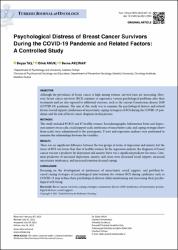| dc.contributor.author | Taş, Beyza | en_US |
| dc.contributor.author | Anuk, Dilek | en_US |
| dc.contributor.author | Akçinar Yayla, Berna | en_US |
| dc.date.accessioned | 2023-10-17T17:14:29Z | |
| dc.date.available | 2023-10-17T17:14:29Z | |
| dc.date.issued | 2023-07 | |
| dc.identifier.citation | Taş, B., Anuk, D. & Akçinar Yayla, B. (2023). Psychological distress of breast cancer survivors during the Covid-19 pandemic and related factors: a controlled study. Türk Onkoloji Dergisi-Turkısh Journal Of Oncology, 38(4), 425-435. doi:10.5505/tjo.2023.3934 | en_US |
| dc.identifier.issn | 1300-7467 | en_US |
| dc.identifier.uri | https://hdl.handle.net/11729/5766 | |
| dc.identifier.uri | http://dx.doi.org/10.5505/tjo.2023.3934 | |
| dc.description.abstract | OBJECTIVE: Although the prevalence of breast cancer is high among women, survival rates are increasing. How-ever, breast cancer survivors (BCS) continue to experience various psychological problems after their treatments and are also exposed to additional stressors, such as the current Coronavirus disease 2019 (COVID-19) pandemic. The aim of this study was to examine the psychological distress and related factors (social support, intolerance of uncertainty, coping strategies) of BCS during the COVID-19 pandemic and the role of breast cancer diagnosis in this process. METHODS: This study included 95 BCS and 87 healthy women. Sociodemographic Information Form and depression anxiety stress scale, social support scale, intolerance of uncertainty scale, and coping strategies short form scales were administered to the participants. T tests and regression analyses were performed to examine the relationships between the variables. RESULTS: There was no significant difference between the two groups in terms of depression and anxiety, but the stress of BCS was lower than that of healthy women. In the regression analysis, the diagnosis of breast cancer was not a predictor for depression and anxiety, but it was a significant predictor for stress. Com-mon predictors of increased depression, anxiety, and stress were decreased social support, increased uncertainty intolerance, and increased emotion-focused coping. CONCLUSION: Focusing on the development of intolerance of uncertainty, social support, and problem-focused coping strategies of psychological interventions for women BCS during epidemics such as COVID-19 may reduce their psychological distress while maintaining and increasing their psychological well-being. | en_US |
| dc.language.iso | en | en_US |
| dc.publisher | KARE Publication | en_US |
| dc.relation.ispartof | Türk Onkoloji Dergisi-Turkısh Journal Of Oncology | en_US |
| dc.rights | info:eu-repo/semantics/openAccess | en_US |
| dc.subject | Breast cancer survivors | en_US |
| dc.subject | Coping strategies | en_US |
| dc.subject | Coronavirus disease 2019 | en_US |
| dc.subject | Intolerance of uncertainty | en_US |
| dc.subject | Psycho-logical distress | en_US |
| dc.subject | Social support | en_US |
| dc.subject | Posttraumatic-stress-disorder | en_US |
| dc.subject | Depression | en_US |
| dc.subject | Symptoms | en_US |
| dc.subject | Anxiety | en_US |
| dc.subject | Intolerance | en_US |
| dc.subject | Uncertainty | en_US |
| dc.subject | Version | en_US |
| dc.subject | Long | en_US |
| dc.subject | SARS-CoV-2 vaccine | en_US |
| dc.subject | Breast cancer | en_US |
| dc.subject | Cancer diagnosis | en_US |
| dc.subject | Cancer survivor | en_US |
| dc.subject | Confusion (uncertainty) | en_US |
| dc.subject | Coping behavior | en_US |
| dc.subject | Coping strategy questionnaire | en_US |
| dc.subject | Coronavirus disease 2019 | en_US |
| dc.subject | Cross-sectional study | en_US |
| dc.subject | Death | en_US |
| dc.subject | Depression | en_US |
| dc.subject | Depression, anxiety and stress scale-21 | en_US |
| dc.subject | Distress syndrome | en_US |
| dc.subject | Educational status | en_US |
| dc.subject | Emotion-focused coping | en_US |
| dc.subject | Health care access | en_US |
| dc.subject | Intolerance of uncertainty scale | en_US |
| dc.subject | Likert scale | en_US |
| dc.subject | Multidimensional scale of perceived social support | en_US |
| dc.subject | Pandemic | en_US |
| dc.subject | Physiological stress | en_US |
| dc.subject | Problem-focused coping | en_US |
| dc.title | Psychological distress of breast cancer survivors during the Covid-19 pandemic and related factors: a controlled study | en_US |
| dc.type | Article | en_US |
| dc.description.version | Publisher's Version | en_US |
| dc.department | Işık Üniversitesi, İktisadi, İdari ve Sosyal Bilimler Fakültesi, Psikoloji Bölümü | en_US |
| dc.department | Işık University, Faculty of Economics, Administrative and Social Sciences, Department of Psychology | en_US |
| dc.authorid | 0000-0003-4530-7957 | |
| dc.authorid | 0000-0003-4768-7463 | |
| dc.authorid | 0000-0003-4530-7957 | en_US |
| dc.authorid | 0000-0003-4768-7463 | en_US |
| dc.identifier.volume | 38 | |
| dc.identifier.issue | 4 | |
| dc.identifier.startpage | 425 | |
| dc.identifier.endpage | 435 | |
| dc.peerreviewed | Yes | en_US |
| dc.publicationstatus | Published | en_US |
| dc.relation.publicationcategory | Makale - Uluslararası Hakemli Dergi - Kurum Öğretim Elemanı | en_US |
| dc.institutionauthor | Taş, Beyza | en_US |
| dc.institutionauthor | Akçinar Yayla, Berna | en_US |
| dc.indekslendigikaynak | Web of Science | en_US |
| dc.indekslendigikaynak | Scopus | en_US |
| dc.indekslendigikaynak | Emerging Sources Citation Index (ESCI) | en_US |
| dc.identifier.wosquality | N/A | en_US |
| dc.identifier.wos | WOS:001071761800001 | |
| dc.identifier.wos | WOS:001071761800001 | en_US |
| dc.identifier.scopus | 2-s2.0-85178895421 | en_US |
| dc.identifier.doi | 10.5505/tjo.2023.3934 | |
| dc.identifier.scopusquality | Q4 | en_US |


















